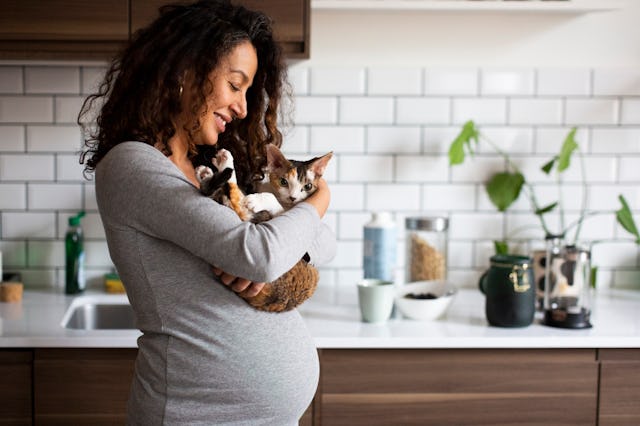Don’t Touch Kitty Litter During Your Pregnancy & Other Pet Care Essentials
A mask and gloves will do you wonders, Mama.

If you’re pregnant, you’ve already got plenty on your plate when it comes to caring for baby and yourself. Outsourcing some tasks is a great way to rest, relax, and enjoy some much-deserved self-care, and we’ll give you one solid reason why you should let your partner or spouse handle the kitty litter for a while: Turns out, you might face an increased risk of picking up a potentially dangerous parasite, especially if you have an outdoor cat.
Before you panic, it’s worth pointing out that you’re probably not getting up close and personal with cat poop on the regular, pregnant or not. That said, you’ll want to take some extra pet-related precautions throughout your pregnancy, especially if you’re the one who typically cleans up after Fido or Fluffy.
Generally speaking, pet owners run some risk of catching zoonotic diseases — i.e., illnesses that can transfer from an animal to a human. But the risk with most household pets is very low, and people are at greater risk of catching something from a wild animal they might encounter than their beloved companions.
Picking Up Poop While Pregnant
OK, so what’s the deal with pregnant people and cat poop, exactly? “Cat poop contains a parasite called toxoplasmosis,” explains Dr. Lindsay Butzer, DVM, and PetMeds partner. “When inhaled by a pregnant person, it may cause miscarriage, stillbirth, birth defects, brain damage, liver, eye and spleen disorders, or no defects at all.”
As terrifying as that sounds, Butzer says, “The good news is that not all cats carry toxoplasmosis, and indoor cats are less likely to carry it. Cats get toxoplasmosis from eating infected raw meat, mostly from rodents and birds outside. Once a cat is infected, they shed this parasite in its feces for up to three weeks,” which typically only happens once or twice in its lifespan. “Mature cats rarely shed toxoplasmosis if they have been previously infected,” she adds. “This means a pregnant woman can only contract toxoplasmosis if the timing is right. This also means that your cat at home may not be a risk to you during pregnancy at all.”
“Humans become infected with toxoplasmosis by cleaning litter with feces and getting fecal matter in their mouth or strongly inhaling spores when the feces is being sifted in the litter scooper,” she says. The spores take 1 to 5 days to 1 become infectious to a pregnant person, so Butzer says if “the litter is cleaned right away (i.e., in less than 24 hours),” the risk will be even lower.
As disgusting as that all sounds, it’s reason enough for the Centers for Disease Control and Prevention (CDC) to advise against pregnant people from handling kitty litter or cat poop. If you do need to do so, Butzer suggests wearing gloves and a mask, cleaning the litter box every day if possible, and washing your hands immediately after each cleaning.
Butzer emphasizes that the risk of becoming sick is low, but it’s still worth taking precautions to prevent it just in case. “Cats also like to poop outside in sandboxes or gardens, so pregnant people should wear gloves or avoid gardening while pregnant. Cats can also poop around fruit and vegetables, and these food items should be cooked thoroughly or washed if consumed during pregnancy.”
It’s all pretty common sense stuff, but worth considering if you already own cats or are thinking of adopting one before you give birth. Butzer says that cat urine and vomit don’t contain these parasites, but you’ll still want to wear gloves and wash hands thoroughly after cleaning up.
Dogs & Other Pets During Pregnancy
When it comes to your beloved canine pal, you will want to take the same precautionary measures when picking up their poop due to the potential to pass worm parasites if you ingest it (ick), though the specific risk to pregnant people is no different than anyone else. If your dog is ill with a bacterial disease called leptospirosis, you’ll want to wear a mask and gloves when cleaning their urine, as this infection can be passed on. But Butzer says your dog would have to be actively infected for this to happen.
For exotic species, salmonella is a concern for any person, pregnant or otherwise, says Butzer. “This bacteria is easily transmissible to humans from hands to mouth. In most people, salmonella causes symptoms like diarrhea, fever, and stomach cramps within 8 to 72 hours. Most healthy people recover within a week. Thankfully, pregnant people who get infected with salmonella have a low chance of spreading this to their babies within the placenta. Moms can recover from salmonella while pregnant, posing little to no risk to baby. Most newborn baby cases are reported if the mom is infected and showing symptoms at the time of birth.”
The TL;DR
Ideally, you can avoid handling kitty litter throughout your pregnancy, but basic measures (a mask and gloves, and thorough hand washing) are crucial if you have to. You can do the same when cleaning up other pet waste, whether you’ve got felines, ferrets, rodents, or rabbits.
For extra peace of mind, Butzer says that cat owners can ask their vet for a full blood panel, which will test for toxoplasmosis and other potential diseases, at the cost of roughly $60 for just toxoplasmosis and $200 for the full panel. Otherwise, frequent hand washing and gloves during cleaning will do just fine.